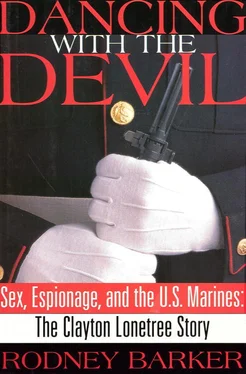At this point Lonetree broke down crying.
• • •
When he had finished the personal-history part of the evaluation, Tom Williams administered a series of psychological tests. The Minnesota Multiphasic Personality Inventory. The California Personality Inventory. The Weschler Adult Intelligence Scale. He didn’t put a whole lot of stock in the tests—he was only half-joking when he admitted that he often gave them just so he wouldn’t have to answer questions about why he didn’t—but there were certain things he was looking for. He wanted to know if Lonetree’s IQ was consistent with the figure that had been reported on the second GCT exam. It was. And he also wanted to determine the statistical level of Lonetree’s intellectual functioning. What he found was that it was low—in the range that would indicate he would have difficulty forecasting the future and projecting the ultimate consequences of his actions. Low enough for Williams to say, Yes, he was someone more susceptible to psychological pressures than the average person, making him easily exploitable. But not so low that Williams could honestly say Clayton Lonetree had mental deficiencies that excused him from responsibility for his actions.
Wrapping the session up with a few encouraging words, Williams walked out of the brig to his car and headed for Major Henderson’s house in Fredericksburg, Virginia, where the entire defense team was waiting to hear his report. As a psychologist he considered it his job to try to explain why a subject behaved the way he did; it was up to the attorneys to figure out where that fit in. But he knew they were hoping for better news and that what he was going to say was probably not going to be of much help in the coming legal proceedings. Childhood traumas threw shadows over their client’s life. Just as the Russians had relied on and taken advantage of his background, so had the CIA and the NIS. But even though Clayton had been an accident waiting to happen, he’d brought this tragedy on himself—the way a lone tree drew lightning.
In mid-March, Special Agent Dave Moyer, the man who had conducted the initial NIS interviews of Lonetree, returned to Vienna as part of the ongoing investigation and, while there, paid a visit to the CIA counterintelligence agent Little John in his diplomatic office in the embassy. Over the previous three months the two men had spoken on several occasions, so Moyer wasn’t expecting anything new to come up, and their conversation this time began as little more than chitchat. Little John asked about the progress of the investigation, and Moyer said they had just about run out of leads on Lonetree, but in the process of corroborating his confession NIS was turning up widespread fraternization among the entire Marine guard detachment. Then, almost in passing, Little John asked if anything hard had been developed on a black Marine by the name of Arnold Bracy.
Moyer remembered the name. Arnold Bracy had served in the Moscow detachment and Lonetree had mentioned he was friendly with him. But he’d said that about several Marines, so Moyer had attached no particular significance to the name.
“What’s interesting about Bracy?” he asked.
Little John shrugged. “Just that he admitted to Lonetree that he’d been the subject of a Soviet recruitment approach.”
This was news to Moyer. “Tell me more.”
“As I recall, Bracy was caught in some sort of liaison with a Russian girl who had worked at the embassy. I’m sure the report was filed with the State Department, because it led to his termination from the security guard program. Anyhow, when I asked Lonetree about it he said Bracy had told him about the relationship, and that he’d cautioned Bracy to be careful.”
From the CPU in the Vienna embassy, Moyer sent a cable back to headquarters recounting his conversation with Little John. He recommended that Arnold Bracy be located and interviewed if he had not already been, and that prudence would dictate that Bracy be considered as a possible espionage suspect.
When the cable arrived on Angelic White’s desk, she sat up straight. Over the previous month, in light of the rampant fraternization revelations, A.W. had refined her original request to the State Department. It had occurred to her that among the Marines who served with Sergeant Lonetree, of special interest would be those who had also stepped over the line, socialized with a foreign national, and been caught. After another go-round with the State Department she had finally received that list, and she had prioritized, instructing agents to concentrate on those Marines who had been bounced for frat first. But nobody at the State Department had asterisked Arnold Bracy for special attention.
Pulling that list out of her desk drawer, A.W. ran her finger down the names until she came to Arnold Bracy. It was at the very bottom. There were no details about his frat offense, nothing that linked him to Lonetree beyond overlapping duty.
The very next thing A.W. did was order a copy of Bracy’s service record from the Marine Corps, and when it arrived she was astounded to find that although the details of his violation were brief, they confirmed Agent Moyer’s report. Sgt. Arnold Bracy had been discovered in a compromising situation with a Soviet woman by the name of Galya Gallotina, a former cook at the embassy, and as a result he had been dropped from the MSG program, demoted to corporal, and reassigned to Twentynine Palms, California, where he was now stationed.
White was furious. The State Department had supplied Bracy’s name back on January 16, two months earlier almost to the day. The outline of Lonetree’s recruitment was common knowledge, so someone over there had to have recognized its similarity to Bracy’s fraternization offense. Yet not one word had been said to them. Had they been given this information, Arnold Bracy would have been interviewed a long time ago.
A.W.’s frustration and anger with the State Department boiled over to include the CIA. The Agency had been closely monitoring all of their investigative reports, so it had to have known that the NIS had not gotten to Bracy yet. Which meant it had been sitting on this information too. Why? Why bring it out now? And what else did they know but weren’t saying?
A.W.’s personal contacts at Langley were limited, but she knew her direct superior in Counterintelligence Investigations, Mike Bruggeman, had a channel open, so that was where she went with her suspicions that the Agency might be holding back on other information that could be relevant to the investigation.
“I’d like to know what the hell else they know,” Angelic White said.
“So would I,” Bruggeman replied. And he assured her he would make a call and see what he could find out.
In the meantime A.W. had no choice but to put these feelings aside. She knew that kicking and screaming at the system would do no good. Besides, there was too much catching up to do.
There were three or four Marines slotted ahead of Bracy, but now he was moved to the top, and Angelic White concentrated on getting ready for his interview. Under ideal circumstances she would have liked more time to prepare, but the lack of interagency cooperation had put NIS in a real bind. It was the middle of March and the ninety-day clock was beginning to sound like a countdown.
Protocol within the Naval Investigative Service dictated that when headquarters had business to conduct within a specific region it went through the regional director of operations (RDO), but to expedite matters, and not wanting to take a chance on losing anything in translation, A.W. received approval from Lanny McCullah to contact directly the special agent in charge (SAC) at Twentynine Palms. Michael Embry was a tough, former vice detective on the Honolulu police department in his late forties whom A.W. knew because he had worked cases with her father and he’d been her counselor at Basic School. She called him, briefed him on what was happening, and told him an action lead sheet that distilled the essential information collected up to this time on both Lonetree and Bracy would be arriving the following day. She stressed that at this point Arnold Bracy should not be regarded as a suspect, but rather as a potential witness against Lonetree. “Find out first how much Bracy knows about Lonetree that we don’t know. That’s our focus. Once that’s cleared up, then you can explore the area of his fraternization.”
Читать дальше












